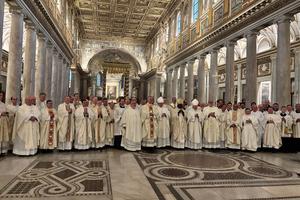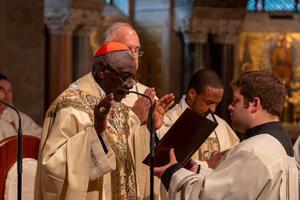Cardinal Robert Sarah, an Authentic Spiritual Guide
COMMENTARY: While the cardinal’s retirement concludes one of the most remarkable assignments of any Curial official, his contributions as a prophetic spiritual father will continue.

At age 75 and in evident good health, Cardinal Robert Sarah likely has many fruitful years ahead of him, but his retirement as prefect of the Congregation for Divine Worship and the Discipline of the Sacraments concludes one of the most remarkable series of assignments of any prelate in the Church.
Cardinal Sarah, ordained in 1969, belongs to the first-generation fruit of early missionary activity in Africa. He fondly recalls how the example of the missionary priests in his village awakened in him a love for prayer and an esteem for the priesthood. He was among the first native-born priests in his native Guinea.
Assassination Assigned for an Archbishop
Cardinal Sarah was appointed archbishop of Conakry, the capital of Guinea, in 1979, after only 10 years a priest, at the age of 34. Guinea was in political crisis, and it was not clear who could lead the local Church effectively against the murderous regime of Ahmed Sékou Touré.
Archbishop Raymond-Marie Tchidimbo of Conakry had been imprisoned by Sékou Touré in 1971 in a campaign of widespread oppression, including religious persecution. He was interned at the notorious Camp Boiro concentration camp for eight years. In August 1979, a deal was reached with the Holy See, and Archbishop Tchidimbo was released, exiled to Rome and resigned his office.
The archbishopric of Conakry in such circumstances was not an attractive preferment. The Holy See settled upon the young Father Sarah, who had no illusions about the prospect of martyrdom which awaited him. Archbishop Sarah was courageous in his defiance of the Marxist dictatorship and earned Sékou Touré’s enmity.
In 1984, Sékou Touré had sudden heart trouble on a trip to Saudi Arabia and was rushed to the United States for emergency medical treatment, where he died unexpectedly. On his desk back in Conakry was a list of those to be assassinated, presumably to be put into effect upon his return. Archbishop Sarah was on the list.
After Sékou Touré died, the Church and society were beset by continued conflict with the regime. After more than 20 years as archbishop, when Archbishop Sarah was appointed to the Roman Curia, he was blunt:
“I know that the people of Guinea have great esteem and respect for me. But I leave Guinea with the impression that I am hated by my government because I speak the truth.”
African Princes in Rome
When Archbishop Sarah arrived in Rome in 2001, he was stepping into the shadow of towering West African prelates, also ordained bishops in their native countries in their early 30s.
The great Cardinal Bernardin Gantin of Benin was brought to Rome by Pope St. Paul VI in the 1970s, made a cardinal in his last consistory in 1977 alongside Joseph Ratzinger, and was promoted to prefect of the Congregation for Bishops in 1984 by Pope St. John Paul II. By 2002, the immensely admired Cardinal Gantin was dean of the College of Cardinals. A holy man of regal bearing, had John Paul II died 10 years earlier, the African cardinal would have been favored by many to succeed him.
In 2002, Cardinal Gantin retired to his native Benin, and the mantle of African leadership in Rome passed to the irrepressible Cardinal Francis Arinze of Nigeria. The long-serving head of the Pontifical Council for Interreligious Dialogue was promoted that same year to the job Cardinal Sarah would eventually get, prefect of the Congregation for Divine Worship. Cardinal Arinze, another fruit of the Church’s early missionary activity in Africa, was one of the most attractive personalities in John Paul’s Curia and a frequent presence in the United States, where he received countless invitations.
After Cardinal Arinze’s retirement in 2008, the mantle shifted to Sarah, made a cardinal in 2010 by Benedict XVI, who had appointed him head of the Pontifical Council “Cor Unum,” which administers the papal charitable works.
It was likely that Cardinal Sarah learned from his fellow West Africans that his role included more than just administering his department.
As a de facto spokesman for the Church in Africa, which Paul VI called “Christ’s new homeland,” Cardinal Sarah would bring to the global Catholic conversation the experience of mission and evangelization in young and growing Churches, a contrast to the weariness and resignation of many from “old Catholic countries” that were hemorrhaging life and energy.
The Triplex Munera of the Church — and Cardinal Sarah
“The Church’s deepest nature is expressed in her three-fold responsibility,” wrote Benedict XVI in his first encyclical, Deus Caritas Est (God Is Love, 25). “Proclaiming the word of God (kerygma-martyria), celebrating the sacraments (leitourgia), and exercising the ministry of charity (diakonia). These duties presuppose each other and are inseparable.”
“Responsibility” or “duties” is a translation of the much richer Latin word munus (singular) or munera (plural). A munus is not just an office or task, but a solemn duty, a mission, even an identity. St. Paul VI began his encyclical Humanae Vitae (The Regulation of Birth) by speaking of the most grave munus that parents have in the transmission of human life.
Cardinal Sarah lived in a unique way the munera of the Church as defined by Benedict XVI.
Cardinal Sarah was first brought to Rome in 2001 by St. John Paul II, who appointed him secretary at the Congregation for the Evangelization of Peoples (Propaganda Fidei), the Vatican department charged with overseeing the mission ad gentes, the proclamation of the word of God — the kerygma-martyria.
He was then appointed head of “Cor Unum” by Benedict XVI, the council that exercises the papal works of charity.
Finally, in 2014, he was promoted by Pope Francis to Divine Worship, where he was charged with the leitourgia, the sacramental life of the Church. Cardinal Sarah lived — not just by appointment, but by zeal and devotion — that triplex munera of the Church.
A Prophet and Guide
At retirement, much commentary presented Cardinal Sarah as the heir to Benedict XVI’s program of liturgical reform. There is truth in that. The heart of Benedict’s vision for liturgical reform was not the extraordinary form, or Tridentine, Mass, which by definition remains extraordinary. Rather, Benedict saw the path forward in the ad orientem celebration of the ordinary form, or Novus Ordo. Cardinal Sarah did his best to advance that practice with limited success; that project will live on for others to take up.
Cardinal Sarah was more Benedict’s heir in becoming a prophetic voice and spiritual guide through his three interview books, all which were international Catholic publishing sensations. Cardinal Ratzinger pioneered the form in 1984 with The Ratzinger Report; now every cardinal and his sacristan does interview books. That Cardinal Sarah’s books would break through to a mass audience amid such a cluttered landscape was remarkable; all the more so, given that Pope Francis himself put out about a dozen interview books at the same time, none of which made the impact of The Ratzinger Report, John Paul’s Crossing the Threshold of Hope or Cardinal Sarah’s trilogy: God or Nothing, The Power of Silence and The Day Is Now Far Spent.
Part autobiography, part prophetic warning, part an examination of ecclesial culture, the books above all are an invitation to recover the primacy of God — in prayer, in proclamation, in mission, in liturgy and in the social order. In his books, Cardinal Sarah reached an audience far beyond the confines of the Roman Curia, becoming a genuine spiritual father and guide.
What’s Next?
Many retired pastors say that, freed from the burden of administrative work, they can “be priests again.” The same is likely more true for cardinals and bishops. No doubt, given his intense interior life — three days without food in the wilderness was a hallmark of his ascetical life in Guinea — it can be expected that Cardinal Sarah will devote more time to seclusion, solitude and prayer.
It would also be expected that he would continue his role as a spiritual guide. He had far more invitations to preach than he could accept while holding Curial office. He is now free to take up that work.
The rise of the internet has made it possible for a single prelate, or even priest, to have an outsized impact. At the same time, the digital world of inflammatory controversies is a present danger. Cardinal Sarah himself skirted that danger last year in supposedly endorsing a statement by Archbishop Carlo Maria Viganò on the pandemic; he quickly distanced himself from it. Cardinal Sarah now will have an opportunity to preach into that world without falling into polarizing polemics. It might take a bit of the power of silence.















